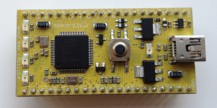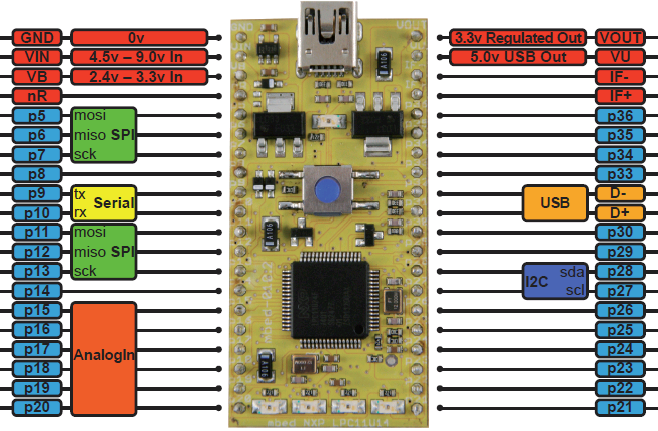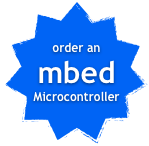mbed NXP LPC11U24
This content relates to a deprecated version of Mbed
Mbed 2 is now deprecated. For the latest version please see the Mbed OS documentation.
Rapid Prototyping for USB devices, battery applications and low-cost 32-bit ARM® Cortex™-M0 based designs

Overview¶
The mbed Microcontrollers are a series of ARM microcontroller development boards designed for rapid prototyping.
- Find out more about all mbed Microcontrollers
The mbed NXP LPC11U24 Microcontroller in particular is designed for prototyping low cost USB devices, battery powered applications and 32-bit ARM® Cortex™-M0 based designs. It is packaged as a small DIP form-factor for prototyping with through-hole PCBs, stripboard and breadboard, and includes a built-in USB FLASH programmer.

The mbed Microcontrollers provide experienced embedded developers a powerful and productive platform for building proof-of-concepts. For developers new to 32-bit microcontrollers, mbed provides an accessible prototyping solution to get projects built with the backing of libraries, resources and support shared in the mbed community.
Features¶
- NXP LPC11U24 MCU
- Low power ARM® Cortex™-M0 Core
- 48MHz, 8KB RAM, 32KB FLASH
- USB Device, 2xSPI, I2C , UART, 6xADC, GPIO
- Prototyping form-factor
- 40-pin 0.1" pitch DIP package, 54x26mm
- 5V USB, 4.5-9V supply or 2.4-3.3V battery
- Built-in USB drag 'n' drop FLASH programmer
- mbed.org Developer Website
- Lightweight Online Compiler
- High level C/C++ SDK
- Cookbook of published libraries and projects
Tools and Software¶
The mbed Microcontrollers are all supported by the mbed.org developer website, including a lightweight Online Compiler for instant access to your working environment on Windows, Linux or Mac OS X.
- Find out more about the mbed Online Compiler
Also included is a C/C++ SDK for productive high-level programming of peripherals. Combined with the wealth of libraries and code examples being published by the mbed community, the platform provides a productive environment for getting things done.
Examples¶
The mbed NXP LPC11U24 Microcontroller is particularly great for building USB devices. Here are some examples:
| USBMouse | USBKeyboard | USBMIDI |
USBMouse example
#include "mbed.h"
#include "USBMouse.h"
USBMouse mouse;
int main() {
int16_t x = 0;
int16_t y = 0;
int32_t radius = 10;
int32_t angle = 0;
while (1) {
x = cos((double)angle*3.14/180.0)*radius;
y = sin((double)angle*3.14/180.0)*radius;
mouse.move(x, y);
angle += 3;
wait(0.001);
}
}
You can find more USB examples on our USBDevice page
The mbed NXP LPC11U24 is also good for prototyping low-power applications. Here the LPC11U24 is put to sleep and woken up by a button to increment and update a display before returning to sleep. The board is running off two AA's cells and drops to couple of milliamps when not is use.
Simple deepsleep and interrupt wakeup example
#include "mbed.h"
#include "TextLCD.h"
TextLCD lcd(p21, p23, p24, p25, p26, p27);
InterruptIn wakeup(p14);
int i = 0;
void count() {
lcd.locate (0,1);
lcd.printf("%d",i);
i++;
wait(0.5);
}
int main () {
wakeup.rise(NULL); // Setup rising edge interrupt (no handler function needed)
lcd.printf("Hello World!");
while (1) {
deepsleep(); // Deep sleep until external interrupt
count(); // We've come out of sleep due to interrupt, so count!
}
}
For both sleep() and deepsleep(), all state is retained so you can see it is a nice simple programming model. Should be great for quickly prototyping some things that need to run off batteries.
Firmware¶
Schematics and Data Sheets¶
mbed NXP LPC11U24 Microcontroller
NXP LPC11U2x MCU
